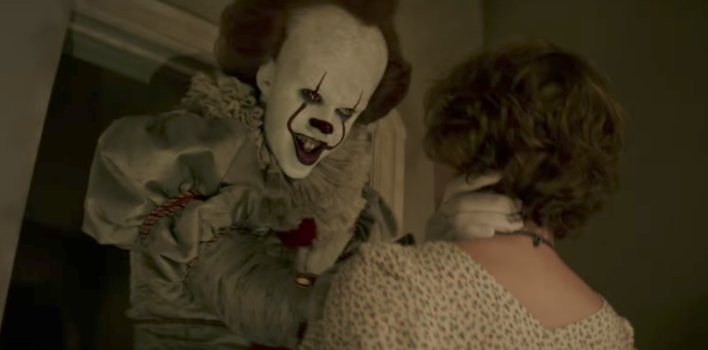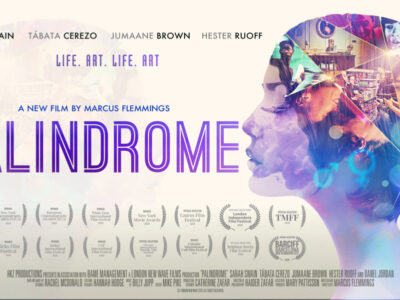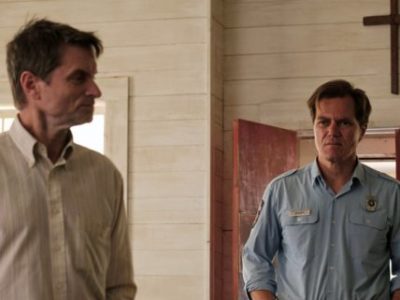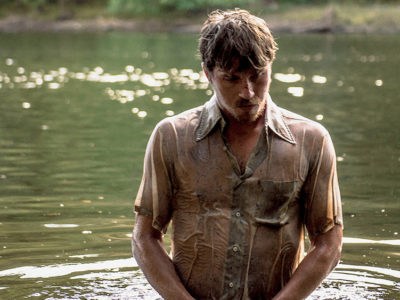Oh! The Horror… | of IT (2017)
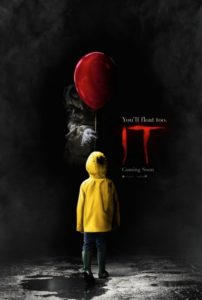 My personal history with the image of, specifically, Tim Curry’s 1990 incarnation of Pennywise the Clown is mired in chronological uncertainty and revisionist history. I don’t remember when I first came in contact with film, let alone the clown. When the made-for-TV movie was released, I was on the verge of being seven years old, but I don’t know if I saw it then or not. I do remember the cackling clown invading my consciousness at a relatively young age. Ever since then I have given clowns an untrusting side-eye. Sometimes it’s merely images, not films, that can traumatize youth.
My personal history with the image of, specifically, Tim Curry’s 1990 incarnation of Pennywise the Clown is mired in chronological uncertainty and revisionist history. I don’t remember when I first came in contact with film, let alone the clown. When the made-for-TV movie was released, I was on the verge of being seven years old, but I don’t know if I saw it then or not. I do remember the cackling clown invading my consciousness at a relatively young age. Ever since then I have given clowns an untrusting side-eye. Sometimes it’s merely images, not films, that can traumatize youth.
I revisited the film years later when I was beginning to immerse myself in the horror genre. It is 3 (plus some change) of the toughest hours to get through. It is melodramatic in all the worst ways, stiff dialogue and acting and less than stellar effects—when they were even used. However, there is one thing that still stands the test of time and makes drudging through the film worthwhile: Tim Curry’s Pennywise. His incarnation of the villain of Stephen King’s novel was both banal—he looks like any party clown in appearance—and alien in his malevolence—the maliciousness of his sharp barbs and stalactite/stalagmite studded smile. That imagery made it very likely that a whole generation of youth would imagine any regular clown in real life as a particularly sinister threat to life and limb. Beds were wetted everywhere.
When word came out that there would be a new adaptation, I was thrilled at the possibility of a creative and technically superior rendering of the book. Add in one of the main kid actors from Stranger Things and I was fully on board. The film did not disappoint on an immediate emotional level and has retained much of the rose-colored tint from that night. It excelled so well that I wanted to revisit Andy Muschietti’s last feature, Mama, which I recall not being won over by on my first viewing. If a film is so good that I am willing to go back and reevaluate past work, then I consider that one of the highest levels of praise that I can give a film.
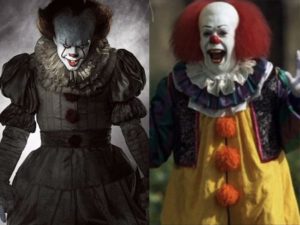 The nostalgic soundtrack hit the perfect note for me as someone who was raised in the late eighties, the prolific amounts of sex and “your mama” jokes that the losers spouted were the same jokes I partook in at their age and the overall feeling that emanated from this coming-of-age story was undeniably effectual like a darker, harder-edged Spielberg adventure tale. It is as close as horror films come to being a “feel good hit of the year.”
The nostalgic soundtrack hit the perfect note for me as someone who was raised in the late eighties, the prolific amounts of sex and “your mama” jokes that the losers spouted were the same jokes I partook in at their age and the overall feeling that emanated from this coming-of-age story was undeniably effectual like a darker, harder-edged Spielberg adventure tale. It is as close as horror films come to being a “feel good hit of the year.”
The acting was on point without a weak link in the bunch, but the standout performance was given by Sophia Lillis who played Bev, the linchpin of the losers. She brought an effervescence to a role that could have been solely delivered with straight dramatic weightiness. It seemed as if the other kid actors were made better by her presence.
Even Bill Skarsgård’s Pennywise is mostly able to fill the shoes of Tim Curry, with his almost lilted, higher-pitched speech. Where Curry went for ferocious volume and exaggerated emphases in his delivery, Skarsgård holds back and seethes underneath a calm exterior. Both incarnations have their upsides and Skarsgård turned out to be an effective pick for this film. It is unfortunate, then, that the film’s one major weakness is that it didn’t trust its own depiction of Pennywise to carry the film without CGI-riddled jump scares. Instead of letting Pennywise speak, stare, and soak in his own malevolent being, they vied for clichéd, fast-cut shaking movement towards his victims throughout the film. It is a lesson that Muschietti could have learned from Wallace: sometimes images are more powerful than effects. Tim Curry proved that, without CGI, for a whole generation of kids.
Even this unfortunate distrust in the creepiness of their own creation could have been forgiven if the CGI hadn’t been a bit dodgy throughout the film. So while there was nothing about Skarsgård I disliked, I remain a fervent defender of Curry’s incarnation because Tommy Lee Wallace recognized that Curry could carry the creepiness of the character throughout most of the film’s runtime on his own acting chops. This film needed to give Pennywise more time to develop, fully, his personality. I am hoping chapter two corrects this mistake by letting Skarsgård do what we know he can do now.
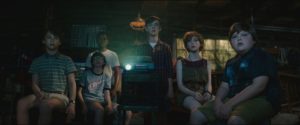 Even with that one glaring flaw, this film is a very strong entry into the oeuvre of Stephen King film adaptations and deserves all of the praise it is receiving. I am highly anticipating the next film in the story, even if part of me wishes they would gather the same cast and release it 27 years from now. But, hey, that’s a pipe dream, right?
Even with that one glaring flaw, this film is a very strong entry into the oeuvre of Stephen King film adaptations and deserves all of the praise it is receiving. I am highly anticipating the next film in the story, even if part of me wishes they would gather the same cast and release it 27 years from now. But, hey, that’s a pipe dream, right?


